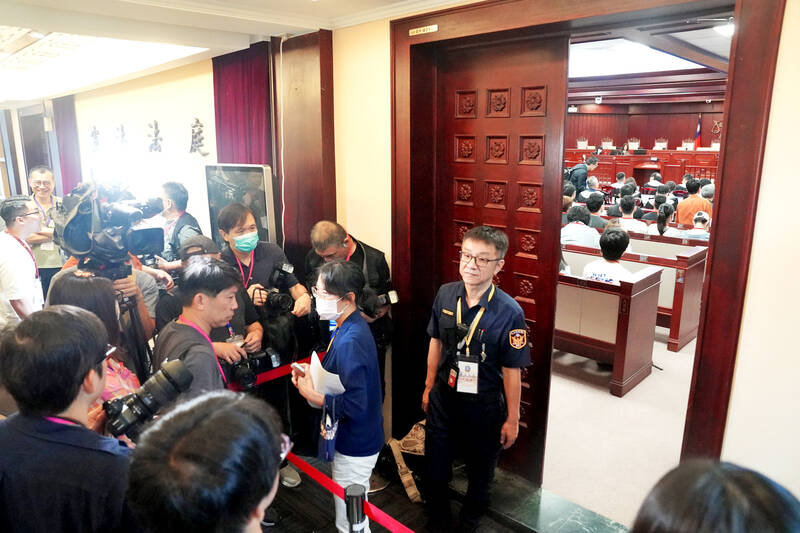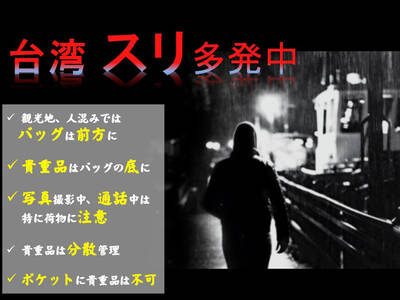This afternoon, the Constitutional Court is to determine whether to abolish the death penalty, but legal experts believe that the court is likely to choose a “middle ground” given the contentious nature of the issue.
The challenge to capital punishment’s constitutionality as one of several statutory penalties has been brought by 37 prisoners on death row who have exhausted the appeals process.
In an interview with the Central News Agency, Jimmy Hsu (許家馨), a research professor of law at Academia Sinica, said rather than declaring the death penalty categorically unconstitutional, the court was “slightly more likely” to choose a “middle ground” option.

Photo: CNA
With three justices recusing themselves, the case is being reviewed by the remaining 12 justices, who together are to render a ruling today based on a majority vote.
An unconstitutional ruling, effective immediately upon its issuance, corresponds to abolishing the death penalty.
As there is broad scope for interpreting articles relating to proportionality, the right of existence and the waiving of protections in certain circumstances, the justices’ own beliefs could tip the scales.
“It all comes down to the personal convictions of the justices,” said Hsu, who acted as an expert witness arguing against a ruling pronouncing capital punishment unconstitutional in April’s oral arguments.
Hsu said that the prevailing view among legal experts favors abolishing the death penalty, reflecting a shift in attitudes over the past quarter of the century in Taiwan and internationally.
To date, the Constitutional Court has issued three rulings concerning the death penalty, each time ruling in favor of retaining the punishment.
The most recent ruling in 1999 upheld capital punishment for serious drug offenses, citing that the harm of illegal narcotics “far outweighs the legal interests of an individual’s life and personal freedoms.”
Hsu said that the current justices are from a different generation than their predecessors who had justified the death penalty.
Many of them developed their academic positions in the late 1980s and early 1990s, when global advocacy for eliminating the death penalty was gaining momentum, he said.
Such overseas influence also paved the way for Taiwan in 2009 to codify the UN’s International Covenant on Civil and Political Rights, which affirms an individual’s right to life and calls for pathways to ending capital punishment, Hsu said.
However, he said that if the court took into account overwhelming public support for the death penalty, it would be “hesitant” to rule it unconstitutional.
Elvin Lu (呂政諺), head of the Law and Policy Department at the Judicial Reform Foundation, said that the likelihood of a blanket unconstitutional ruling on the death penalty was equal to that of a more moderate decision.
Lu said that an unconstitutional ruling, while favorable to the foundation, which serves as a friend of the court and shares the petitioners’ positions, could trigger a strong public backlash.
A 2012 report by the Ministry of Justice said that nearly 77 percent of Taiwanese opposed abolishing the death penalty, while about 21 percent were in favor.
The ministry has defended existing practices as constitutional and has suggested that the highly disputed issue be left to the discretion of the legislature.
Public opinion has not changed significantly in the past decade.
Polls conducted by the Crime Research Center at National Chung Cheng University last year revealed that nearly 86 percent of Taiwanese were against abolishing the death penalty, with only 14 percent supporting abolition.
Lu said that a split court decision would effectively maintain the “status quo,” considering the implementation of the death penalty has been “extremely restricted” in Taiwan.
In such a scenario, the court might continue to allow the use of the death penalty for homicide, but not for other crimes, such as drug dealing, still covered by the law, Lu said.
In practice, courts subject only those convicted of serious murders to the death penalty, in keeping with the UN convention Taiwan adopted in 2009, Lu said.
Furthermore, every death penalty case would be automatically appealed until the Supreme Court makes a final decision, as per the Code of Criminal Procedure (刑事訴訟法), to ensure the most rigorous review process possible, he said.
Currently 45 people, including eight whose sentences are subject to an appeal, are on death row in Taiwan, foundation data shows.
Executions have diminished significantly in the past eight years under former president Tsai Ing-wen (蔡英文) of the Democratic Progressive Party, with only two carried out compared with 33 during the eight-year tenure of former president Ma Ying-jeou (馬英九) of the Chinese Nationalist Party (KMT).
From an abolitionist point of view, a middling court decision would set back Taiwan’s move toward a society without capital punishment, as justices are unlikely to reconsider the issue for another 10 to 20 years after today’s ruling, Lu said.
Hsu disagreed, saying that with a moderate ruling, further reforms to the death penalty system could be achieved before a societal consensus on abolition is reached.
Possible measures include imposing a moratorium on executions or introducing more stringent rules for reviewing criminal cases, he said.
Eliminating the death penalty might not only provoke a public outcry, but also lead to “serious political repercussions,” Hsu said, adding that it could exacerbate divisions in the legislature and even impact elections.
In the legislature, the KMT caucus strongly objects to abolition, while the Taiwan People’s Party (TPP) has yet to take a clear stance.
The DPP, which has set abolition as its long-term goal, has largely kept mum on the case, with DPP caucus whip Ker Chien-ming (柯建銘) in April saying that such a cause required “a general consensus in society.”
Lu said the Constitutional Court is expected to give additional instructions on how to handle the 37 prisoners on death row if it revokes the death penalty.
He said the court could have the head prosecutor of the Supreme Prosecutors’ Office file an extraordinary appeal or order a retrial of the petitioners’ cases.
Both experts consider it least likely that the Constitutional Court would rule the death penalty fully constitutional, for if the justices intended to keep the legal provisions intact, they would have declined to review the case.
However, it remains unclear why the court accepted the petitions.
In a written response to the Central News Agency, the Constitutional Court’s clerk department said that the reason would be outlined in its ruling.

The Japan-Taiwan Exchange Association has cautioned Japanese travelers to be vigilant against pickpockets at several popular tourist spots in Taiwan, including Taipei’s night markets, the Yongkang Street area, Zhongshan MRT Station, and Jiufen (九份) in New Taipei City. The advisory, titled “Recent Development of Concerns,” was posted on the association’s Web site under its safety and emergency report section. It urges travelers to keep backpacks fully zipped and carried in front, with valuables placed at the bottom of the bag. Visitors are advised to be especially mindful of their belongings when taking photos or speaking on the phone, avoid storing wallets and

ENDORSING TAIWAN: Honduran presidential candidate Nasry Afura said that Honduras was ‘100 times better off’ when it was allied with Taipei The Ministry of Foreign Affairs yesterday said it would explore the possibility of restoring diplomatic relations with Honduras based on the principle of maintaining national interests and dignity. The ministry made the remarks in response to reporters’ questions regarding an article titled: “Will Taiwan Regain a Diplomatic Ally?” published in The Diplomat on Saturday. The article said Honduras’ presidential election in November could offer Taiwan the chance to regain an ally, as multiple candidates have promoted re-establishing diplomatic relations with Taiwan. Honduras severed diplomatic ties with Taiwan in March 2023 in favor of Beijing, but since switching its diplomatic recognition,

Scoot announced yesterday that starting in October, it would increase flights between Taipei and Japan’s Narita airport and Hokkaido, and between Singapore and Taipei. The low-cost airline, a subsidiary of Singapore Airlines, also said it would launch flights to Chiang Rai in Thailand, Okinawa and Tokyo’s Haneda airport between December and March next year. Flights between Singapore and Chiang Rai would begin on Jan. 1, with five flights per week operated by an Embraer E190-E2 aircraft, Scoot said. Flights between Singapore and Okinawa would begin on Dec. 15, with three flights per week operated by Airbus A320 aircraft, the airline said. Services between Singapore

A fourth public debate was held today about restarting the recently decommissioned Ma-anshan Nuclear Power Plant, ahead of a referendum on the controversial issue to be held in less than two weeks. A referendum on Aug. 23 is to ask voters if they agree that “the Ma-anshan Nuclear Power Plant should continue operations upon approval by the competent authority and confirmation that there are no safety concerns.” Anyone over 18 years of age can vote in the referendum. The vote comes just three months after its final reactor shut down, officially making Taiwan nuclear-free. Taiwan People’s Party Chairman Huang Kuo-chang (黃國昌) represented